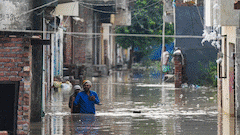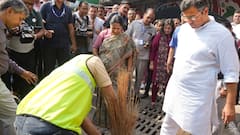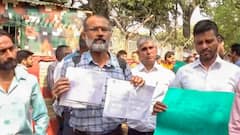13 Hotspots Identified, War Room To Monitor Delhi Pollution: Kejriwal Releases 15-Point 'Winter Action Plan'
Delhi CM Arvind Kejriwal has released a 15-point 'Winter Action Plan' to contain pollution in the national capital in upcoming months.

In a bid to curb pollution in the national capital during winter months, Delhi CM Arvind Kejriwal on Friday released a 15-point 'Winter Action Plan'. The city witnesses smog, worsening air every year during winters. To battle the same, CM Kejriwal listed out a list of measures that the government will take to reduce the dust, and air pollution in the national capital. He said that a green war room will be set up and bio-decomposer will be used in an area of 5,000 acres this time. The CM also announced a number of teams to monitor rules compliance, dust pollution at construction sites, and vehicular pollution in the city among other activities.
"We have identified 13 hotspots where pollution is high. We have a special action plan for each hotspot. A war room and 13 special teams have been made to keep pollution down in these hotspots," he said.
VIDEO | "We have identified 13 hotspots where pollution is high. We have a special action plan for each hotspot. A war room and 13 special teams have been made to keep pollution down in these hotspots," says Delhi CM @ArvindKejriwal as he releases Winter Action Plan. pic.twitter.com/QGtHe7fykv
— Press Trust of India (@PTI_News) September 29, 2023
Speaking on the issue of stubble burning, he said that data from last year in Punjab shows the steps taken in 6-7 months led to a 30 per cent reduction in stubble burning. He added that CM Bhagwant Mann's government in Punjab has taken several steps, one of which is the diversification of crops. "This will save water and lower stubble burning," he said.
"...Secondly, the varieties of paddy - the short-term varieties have. This has less stubble and it need not be burnt. Ex-situ management of stubble - for this a few companies have adopted districts and will carry their stubble to convert it into manure or electricity...I think there should be improvement this year," the Chief Minister said.
"There were two thermal power plants in Delhi, both of them have been shut now. Heavy fines are being imposed over those responsible for dust pollution. Industrial units in Delhi earlier used polluting fuel but now they have been shifted to piped natural gas (PNG)," CM Kejriwal said.
VIDEO | "There were two thermal power plants in Delhi, both of them have been shut now. Heavy fines are being imposed over those responsible for dust pollution. Industrial units in Delhi earlier used polluting fuel but now they have been shifted to piped natural gas (PNG)," says… pic.twitter.com/rOQXfBIfZB
— Press Trust of India (@PTI_News) September 29, 2023
The CM said pollution levels declined in the city due to government initiatives. "611 teams will monitor open garbage burning, smog guns and 530 water sprinklers to be deployed," the CM said.
He added, "385 teams will check vehicles' age, pollution certificate; 90 roads with heavy traffic identified, will publicise alternative routes".
The CM said that 90 congested roads have also been identified that will be monitored to get rid of traffic congestion. He said that various awareness initiatives will also be undertaken with the aim of receiving people's help to curb pollution.
This comes nearly two weeks after Kejriwal held a meeting with 28 departments. The Delhi government had identified 13 hotspots in the national capital and added that a special plan would be chalked out for them. Speaking to the media, Gopal Rai had said, "We held a meeting with 28 departments today and all have been directed to give their winter action plans by September 25. There are 13 such hotspots that have been identified and a special plan will be made for them."
“The 15 points that we will focus on are - hotspots, stubble pollution, vehicular pollution, open garbage burning, industrial pollution, green war room, real-time apportionment study, complete ban on firecrackers, tree plantation, urban farming, eco waste park, public awareness, communication with the Centre, neighbouring states and implementation of GRAP (Graded Response Action Plan),” Rai said, as quoted by PTI.





































